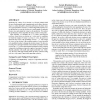Free Online Productivity Tools
i2Speak
i2Symbol
i2OCR
iTex2Img
iWeb2Print
iWeb2Shot
i2Type
iPdf2Split
iPdf2Merge
i2Bopomofo
i2Arabic
i2Style
i2Image
i2PDF
iLatex2Rtf
Sci2ools
ATAL
2015
Springer
2015
Springer
Sample Complexity for Winner Prediction in Elections
Predicting the winner of an election is a favorite problem both for news media pundits and computational social choice theorists. Since it is often infeasible to elicit the preferences of all the voters in a typical prediction scenario, a common algorithm used for winner prediction is to run the election on a small sample of randomly chosen votes and output the winner as the prediction. We analyze the performance of this algorithm for many common voting rules. More formally, we introduce the (ε, δ)-winner determination problem, where given an election on n voters and m candidates in which the margin of victory is at least εn votes, the goal is to determine the winner with probability at least 1 − δ. The margin of victory of an election is the smallest number of votes that need to be modified in order to change the election winner. We show interesting lower and upper bounds on the number of samples needed to solve the (ε, δ)-winner determination problem for many common voting ...
| Added | 16 Apr 2016 |
| Updated | 16 Apr 2016 |
| Type | Journal |
| Year | 2015 |
| Where | ATAL |
| Authors | Palash Dey, Arnab Bhattacharyya |
Comments (0)

